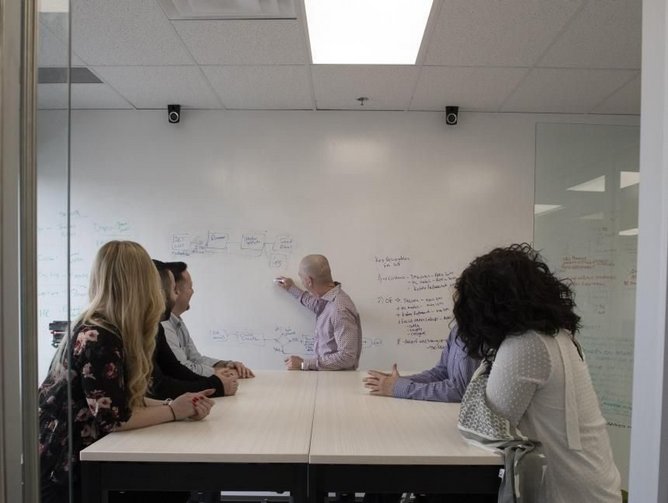Polaris Transport is leveraging a standalone digital transformation unit to drive logistical innovation
Canada’s Polaris Transportation Group, renowned for its cross-border less than load (LTL) service, is at the cutting edge of technological innovation in the supply chain sector. In January 2019, the company launched NorthStar Digital Solutions (NDS), both an in-house digital laboratory and separate business entity, to drive the advancement of its technology platforms, intelligent document processing, Robotic Process Automation (RPA), Machine Learning (ML), Artificial Intelligence (AI), Internet of Things (IoT) and Distributed Ledger Technology (DLT) capabilities, among others.
Dave Brajkovich, CTO at Polaris and NDS, says the new company offers Polaris, as both a customer and an owner, a level of innovative dedication that is demonstrably lost by internal and integral IT teams attempting to steer a digital transformation. “It’s not uncommon that, under one IT wing, things can quickly become disjointed – IT begins to manage network, infrastructure, application, and helpdesk which distracts from a focused transformation,” he explains. “We saw an opportunity to drive technology and optimization as a separate entity, and become a profit center that can take the solutions we’re providing to Polaris and package them up as Software-as-a-Service (SaaS) solutions for transportation and customs brokerage clients, and beyond.” The close relationship between Polaris and NDS enables a flexible and practical testbed for innovation, with newly developed solutions being piloted, tested and production hardened at Polaris before being sold on to external companies. “We end up learning a lot from these programs and enhancing the technology to fit and solve business needs rather than creating technology and finding a problem to solve.”
A main staple for Polaris is customs document processing for clearing freight to cross the US and Canadian borders, and this offers a perfect example of the company’s successful transformation efforts. As this can carry myriad complexities and duplication in work efforts, Polaris needed to streamline the task and reduce the touchpoints of handling paperwork. The process of moving paper is highly inefficient and labor intensive for all players involved, including the Client, Carrier, Customs Broker and Border Agencies. “By implementing our RPA and ML platform (a powerful WorkFusion enterprise grade automation engine with the NDS IP workflow solution), to manage Straight Through Processing (STP) for our intelligent document processing, our turnaround time and error rates were significantly reduced to levels beyond our expectations,” says Brajkovich. “It also added capacity for our staff to focus on exception management rather than clerical administration. We can now run this operation 24/7 and scale to the business order demands, and we’re proud to state that we are now driving 80% of our customs paperwork processing through fully automated workflow.”
Of the aforementioned technologies, Polaris’s DLT platform is perhaps the most emblematic of the firm’s ability to bring complex concepts through to fruition quickly and effectively. “Our CEO, Dave Cox, had an inkling to learn more about blockchain,” says Brajkovich. Following an event that illuminated the tech’s qualities, Cox began to see a potential use case for it within Polaris. The firm subsequently partnered with IBM to generate various DLT-based solutions applicable to their operations, with significant success. “One of our use cases for a minimal viable product was an outcome to achieve consolidation and reconciliation for the interline invoicing process,” says Brajkovich. “We found that the process was lagging, though not in terms of digitizing the data because it moves through electronic data interchange (EDI) transformations anyway. The challenge is that EDI is not dynamic – it’s very static, it comes in batches and waves – and so the freight can be received by points of delivery where we may not get the data back into our systems accurately or in a timely fashion.”
This problem causes both delays and a labor-intensive process of collating documents to confirm payments, with those documents changing hands repeatedly. The solution is a DLT-based smart contract platform that runs those transactions through Polaris’s hyperledger cloud and relays the data to all relevant parties. “What we’ve created is a universal system where we can guarantee that my A is their A,” says Brajkovich, highlighting DLT’s ability to serve as a single, current source of truth. “Everything is tracked and traced: it’s immutable, it’s not going to change, but it can be revised. As the information flows from one system to another, we know exactly where that data flow is.” Not only does the solution provide this reliability and traceability, but it massively increases the speed with which parties can access the relevant information. “Once the transaction is completed, we have a full audit trail,” summarizes Brajkovich. He adds that the process minimizes paper wastage, maximizes accuracy and eradicates data-based disputes, as well as having the flexibility for additional partner channels to be added as necessary.
NDS is currently developing additional IoT-driven solutions to augment with this process, offering real-time tracking data without necessitating additional human input. “Our claim to fame here is that we’re very strong integrators,” says Brajkovich as he explains the foundation of the firm’s IoT success. “We have talent that understands not only the operations and processes involved with the transportation and LTL freight movement, but we have a very strong enterprise service technology layer that enables us to connect multiple technologies and platforms through APIs (application programming interfaces).” With IoT naturally creating numerous endpoints at the edge of the network, this knack for integration significantly accelerates NDS’s and Polaris’s time to market for additional IoT capabilities. “Currently, we are active through an IoT process for our electronic logging devices (ELDs), used for truck driver mandates and tractor data logging. We capture data from the ELDs, as well as from Blackberry devices tracking our trailers’ capacity, volume and location. We have between 160 and 180 trailers, and they’re all tracked.” The data is routed back through the company’s legacy API system, exemplifying the company’s ability to integrate technological solutions successfully. Looking forward, Brajkovich says NDS’s IoT ambitions are yet to be satisfied, and plenty of exciting new innovations are on the way.
The firm is piloting a new product that tracks drivers’ locations through their mobile devices, enabling visibility of delivery routes, delivery cycles, and access to various timeframes for cycle completion. “It’s quite revolutionary in commercial freight movements,” says Brajkovich. “Most clients don’t get that kind of visibility. They have to call customer services, who themselves have to track those trucks and have more room for inaccuracy. This way, it’ll be a holistic view of where our trucks are.” In addition to this novel approach to visibility for clients, NDS is developing a brand new form of IoT technology. “We’re working with a couple of GPS manufacturers to develop a disposable GPS tracking device that we could directly tag to the freight, as well as working with telco companies that could provide us with low-cost cell coverage at a palatable price point that clients can absorb,” enthuses Brajkovich. “In return, they would get active tracking at the freight level.” He notes that perhaps the most vitally innovative element of this research and development is the proposed disposability. “When it is received at the last mile, the GPS will simply turn off as its battery expires and can then be easily disposed of,” he says. Enabling visibility in such a dynamic, seamless fashion would stand to differentiate the firm’s prowess even further from the competition.
Ultimately, Brajkovich credits NDS and the strength of its partnerships with the success of Polaris’s technological innovations. “NDS, powered by strong partners like WorkFusion, Softchoice, Stratiform, Simnet and Fiorano has enabled us to launch some really dynamic offerings using tools that might not be at the bleeding edge, but certainly within the cutting edge,” he says. “We’ve proven that we can take a company from a very segregated, siloed system that’s hard to integrate and communicate within, to a company that is lean, efficient and technologically scalable. The ability for us to be able to look internally and externally, and really prioritize the most vital projects means we can leap instead of baby-step everything through.” Polaris Transport, in that regard, has landed upon a holy grail of digital transformation: agility, scalability, and a time to market that brings core innovations to the fore, benefitting both the company and its all-important clients.





